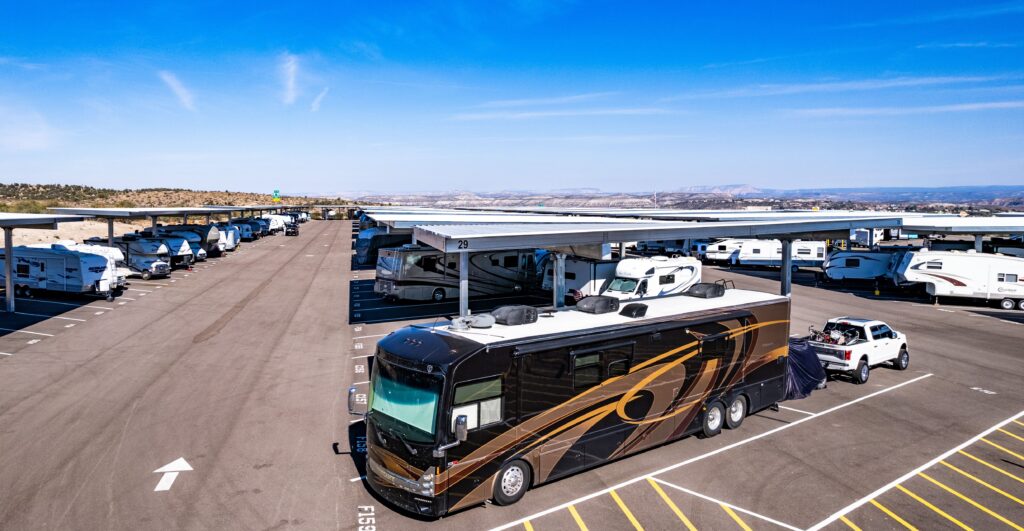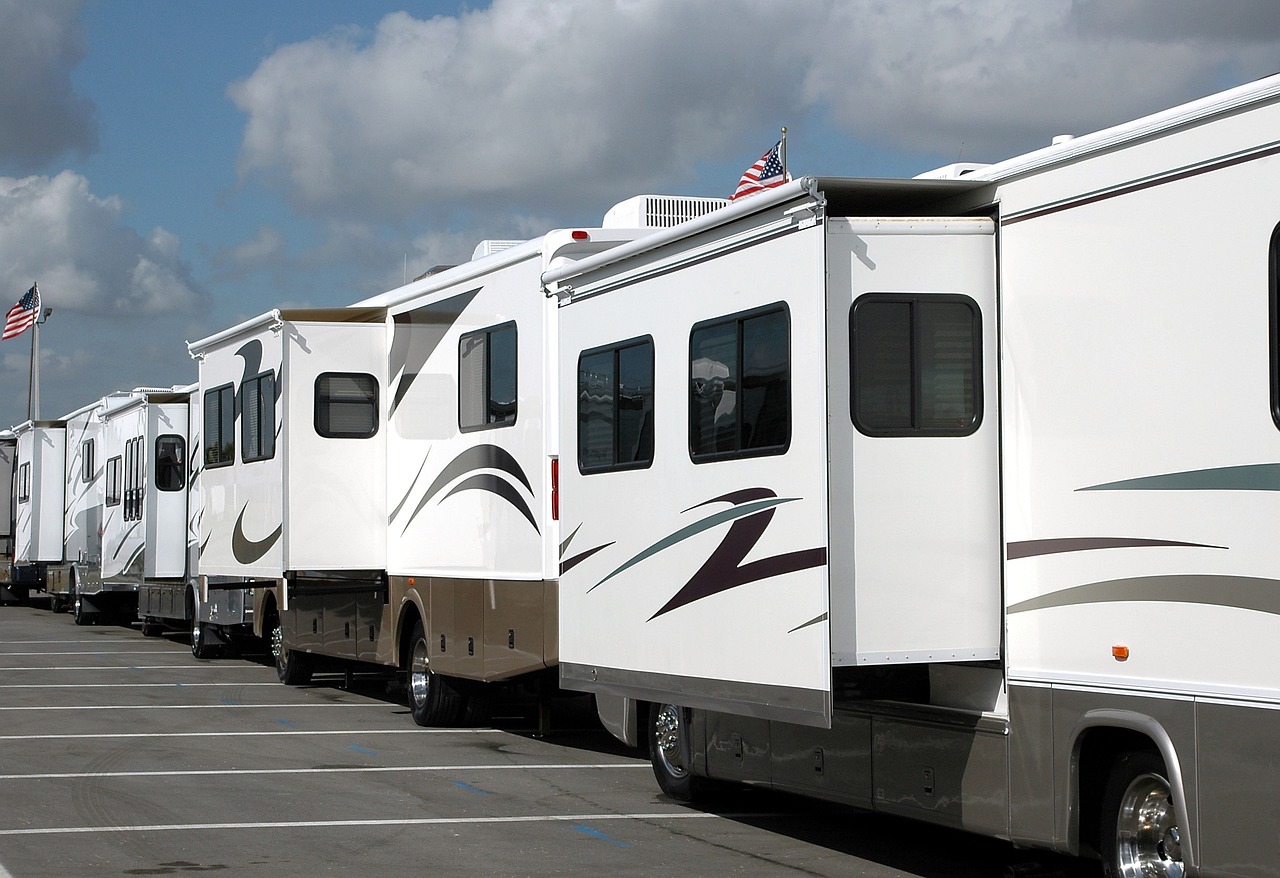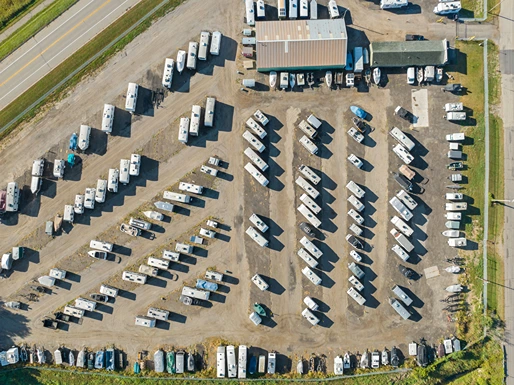Storing your RV properly requires more than just finding a spot and leaving it. Regular maintenance helps ensure that your RV stays in good condition while it’s in storage. While we can’t guarantee these tips will prevent every issue, they may help keep your RV in better shape. This guide will walk through some essential RV storage maintenance tips, using simple language and helpful suggestions to maintain readability.

Prepare Your RV for Storage
Before placing your RV in storage, there are a few steps you might want to take to prepare it for a long-term stay. Pre-storage maintenance can reduce wear and tear on your vehicle.
Clean the Exterior
A clean RV is less likely to develop issues while in storage. Dirt, grime, and bird droppings can cause damage to your RV’s paint and exterior surfaces over time. Consider washing and waxing the exterior of your RV before storing it. Wax adds a layer of protection that may help preserve the paint and shield it from outdoor elements.
Check Tire Pressure
Tires can lose pressure during long periods of inactivity. Before storing your RV, check each tire’s pressure. If tires are underinflated, they may develop flat spots. It’s possible to use tire covers to protect them from UV rays and weather exposure, which can also help extend their lifespan.
Engine and Fuel System Care in RV Storage
Your RV’s engine and fuel system might require extra care before placing the vehicle into storage. Engines that sit idle for long periods may face problems when you’re ready to drive again.
Add Fuel Stabilizer
Fuel stabilizer is an additive that could help prevent fuel from breaking down while your RV is in storage. When fuel sits for too long, it can separate and create sludge, which may clog the engine. Adding a fuel stabilizer before storage could reduce the chances of engine trouble later on. You might want to fill the tank to avoid moisture build-up and ensure the fuel stabilizer mixes well.
Change the Oil
Old oil can corrode parts of the engine when left unchanged. Consider changing the oil and oil filter before storing your RV. This step may help keep the engine in better condition while it sits. It’s possible that this simple task could also make it easier to get your RV running again when you need it.
Electrical System Maintenance for RV Storage
The electrical systems in your RV are another critical area to pay attention to. Maintaining your RV’s battery and electronics can save you from a dead battery or other problems down the road.
Disconnect the Battery
If your RV will be in storage for a while, disconnecting the battery could prevent it from draining. A fully charged battery can lose power over time, and you might find yourself needing a jumpstart if it’s left connected. It’s also worth considering a battery maintainer or trickle charger, which can help keep the battery charged at a safe level while in storage.
Call us TODAY and learn more about the units we have available to secure your boat or RV in Mason City!
Protect Wiring from Pests
One issue some RV owners face during storage is pests. Rodents and small animals can find their way into your RV and chew on electrical wiring. You might want to inspect your RV for any gaps or cracks where pests could enter. Using deterrents, like mothballs or peppermint oil, can help keep critters away.
Interior Maintenance Tips for RV Storage
The interior of your RV may also need attention before storage. Proper maintenance of the interior could reduce damage and make your RV more comfortable to use when you’re ready to hit the road again.
Clean and Empty the Refrigerator
A common RV storage mistake is leaving food in the refrigerator. Even with power off, leftover food can create unpleasant odors and mold. Before storing your RV, be sure to clean out the fridge and leave the door slightly open to promote airflow. Placing a box of baking soda inside may also help absorb any remaining odors.
Remove Personal Items
While your RV is in storage, it’s best to remove valuable or personal items. RV storage facilities may not always guarantee full protection, and removing your items could reduce the risk of theft. It’s also a good idea to ensure all cabinets and storage areas are clean to avoid unwanted surprises later on.
Maintaining Water and Plumbing Systems in RV Storage
The plumbing and water systems in your RV can cause issues if not properly prepared for storage. These tips may help prevent damage and ensure everything works smoothly when you’re ready to use the RV again.
Drain the Water System
Stagnant water can cause pipes to freeze or develop mold while your RV is in storage. Consider draining the water system entirely, including the water heater, holding tanks, and pipes. You might also want to blow out any remaining water using compressed air to avoid any lingering moisture that could damage the system.
Add Antifreeze to the Plumbing
If you’re storing your RV in a location where temperatures drop below freezing, adding RV antifreeze to the plumbing system could help prevent frozen pipes. Be sure to follow the manufacturer’s recommendations on how much antifreeze to use and which parts of the system to treat. This step may prevent cracks and leaks during the colder months.

Keep Your RV Ventilated
Good ventilation could be essential in preventing odors and mold from building up inside your RV during storage. Moisture trapped in your RV’s interior can lead to musty smells, mildew, and other issues.
Use Moisture Absorbers
Consider placing moisture absorbers, like silica gel or dehumidifiers, throughout the RV. These products might help control humidity levels and keep the air inside fresh. You could also crack windows slightly to allow air circulation, but make sure to cover the openings to keep pests out.
Routine Check-Ups for RV Storage
Even while your RV is in storage, occasional check-ups might be necessary to ensure everything remains in good condition. These check-ins could help you catch any potential problems before they worsen.
Inspect for Leaks
Over time, seals and caulking on your RV may deteriorate, leading to leaks. During storage, it’s a good idea to periodically inspect the roof and windows for signs of wear. Catching leaks early might prevent water damage to the interior of your RV.
Check the Tires
Tires may lose air or develop flat spots if left untouched for too long. Checking the tire pressure during routine inspections could prevent issues. Rotating the tires periodically might also help spread out the pressure and reduce wear on one side.
Conclusion
Taking care of your RV while it’s in storage involves more than just parking it in a lot. By following some of these essential RV storage maintenance tips, you could extend the life of your vehicle and ensure it’s ready for use when you need it. Always keep in mind that these are just suggestions—nothing can guarantee that every problem will be avoided, but a little preparation and attention might go a long way in keeping your RV in great condition.
Reach out to us HERE and explore your options. We have what you need in Mason City, Iowa!
Disclaimer:
The information provided is intended for educational purposes only and should not be taken as advice nor are there guarantees of any kind.


